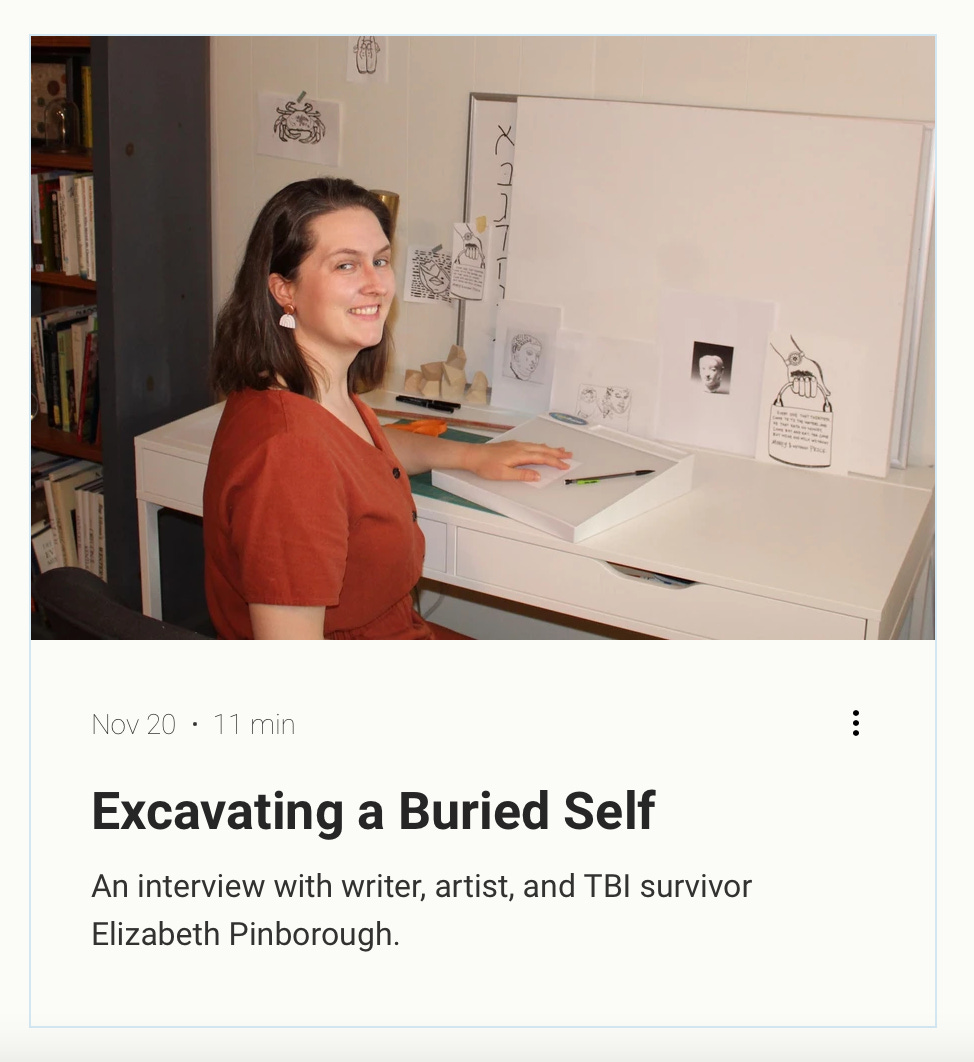Welcome to issue 3! If you’re new to The Lovely Brains Newsletter, I’m glad you’re here to read artful dispatches from the world of brain injury recovery (with dashes of poetry and science). Catch up on issues 1 and 2.
Speaking with Abby Jarman of Headstrong about my brain injury was easily one of the highlights of this year. Incredible TBI-survivor and friend, Camille Moffat, introduced me to Abby, and I am so glad she did.
Abby started Headstrong for NeuroRecovery with her mom, Heather, to share complex, human stories of neurorehabilitation. They are documenting Abby’s intense neurorehab process following her brain surgery and highlighting the rehabilitation journeys of other brain injury survivors and their caregivers along the way. It’s an amazing project and a humbling sacrifice given the fact that they are walking through a rehabilitation crucible.
With a brain injury, communicating the incommunicable in a way that will be heard and attended to is a persistent challenge. The knowledge of what living with a brain injury is like is somewhat unintelligible to those who have not experienced it, which creates a solemn sisterhood and brotherhood among those who know how it is to try to communicate with wounded and violently disconnected cells.
Speaking with Abby, who knows the costs of healing with the immense burden of cognitive disruption and yet expresses herself lyrically and creatively, feels like sacred ground. While sharing my story with Abby I felt seen, heard, and safely held in my experience of brain injury, and that is truly a rare gift in an experience that feels unseen, unheard, and enormously risky on the inside. Abby has many gifts that make her a truly remarkable individual, and I am so grateful to know her and feel buoyed up by her understanding.
Here’s an excerpt of our conversation:
I also didn’t know where I was in the timeline of my life. My life’s clock stopped on the day of my injury, erasing memories and cutting off organic neurological access to a whole catalogue of my experiences, hard-earned knowledge, and skills. For several years, I felt stuck in the timeless post-injury land of 2015. It’s only been in the past year that I’ve felt like I’m returning to something more like my previous wiring and relationship to the arc of my life's timeline. Access to my memories keep coming back, but I still feel disoriented because of the way my self became disorganized.
I talk about how time is created by the brain, what it’s like with a brain injury during the pandemic, and the grief of lost identity. You can read the rest of our interview, “Excavating a Buried Self,” here.
Supporting the mission of SameYou, Abby and Heather hope people who follow the Headstrong project will advocate both for those experiencing neurological challenges and for their caregivers. They want each of us to see the unseen and then step in to do something. I love SameYou, begun by Emilia Clark, who, as her Game of Thrones career was taking off, survived two brain aneurysms (TW: brain surgery). I support SameYou’s mission, and I hope you’ll join me in doing the same in whatever situation and environment you’re in.
One of the greatest gifts anyone can give someone with a brain injury is to attempt to understand the experience from their perspective and then find ways to help. To that end, I hope you’ll take some time to read the other stories of survivors on the Headstrong blog, like Camille’s. The more people who step in with their own hard-earned knowledge and abilities to mend these gaps, the smoother the way will be for people with brain injuries to heal faster and less expensively.
I wish I could say more right now. Writing this much has involved stops and starts and more brain effort than I wish. Until next time.
A Short Poem I Liked about the Brain
“The Extra Brain,” by Michael Eilperin
Brainy Newsletters
If you’re looking for neuroscience education delivered to your inbox, consider subscribing to these newsletters:
Friday Brainstorm Newsletter: Shamay Agaron makes cognitive neuroscience accessible, and as someone who has used acupuncture to manage pain, I was fascinated to learn about the biological wifi of cellular communication in the latest issue.
Synapse: Clayton Mansel seeks to bring academic rigor and thoughtfulness to accessible neuroscience reporting.
Book Notes
Happy update! The Brain’s Lectionary: Psalms and Observations is officially in production at my publisher. Mid-January-ish 2021 is when it looks like the book will be quietly unleashed. Stay tuned.
If this newsletter has been helpful, feel free to share it with a brain injury survivor or brain injury advocate. TLBN also has an IG account @lovelybrainspress! See you next month, and have a safe entry into the new (thank goodness for that) year.






